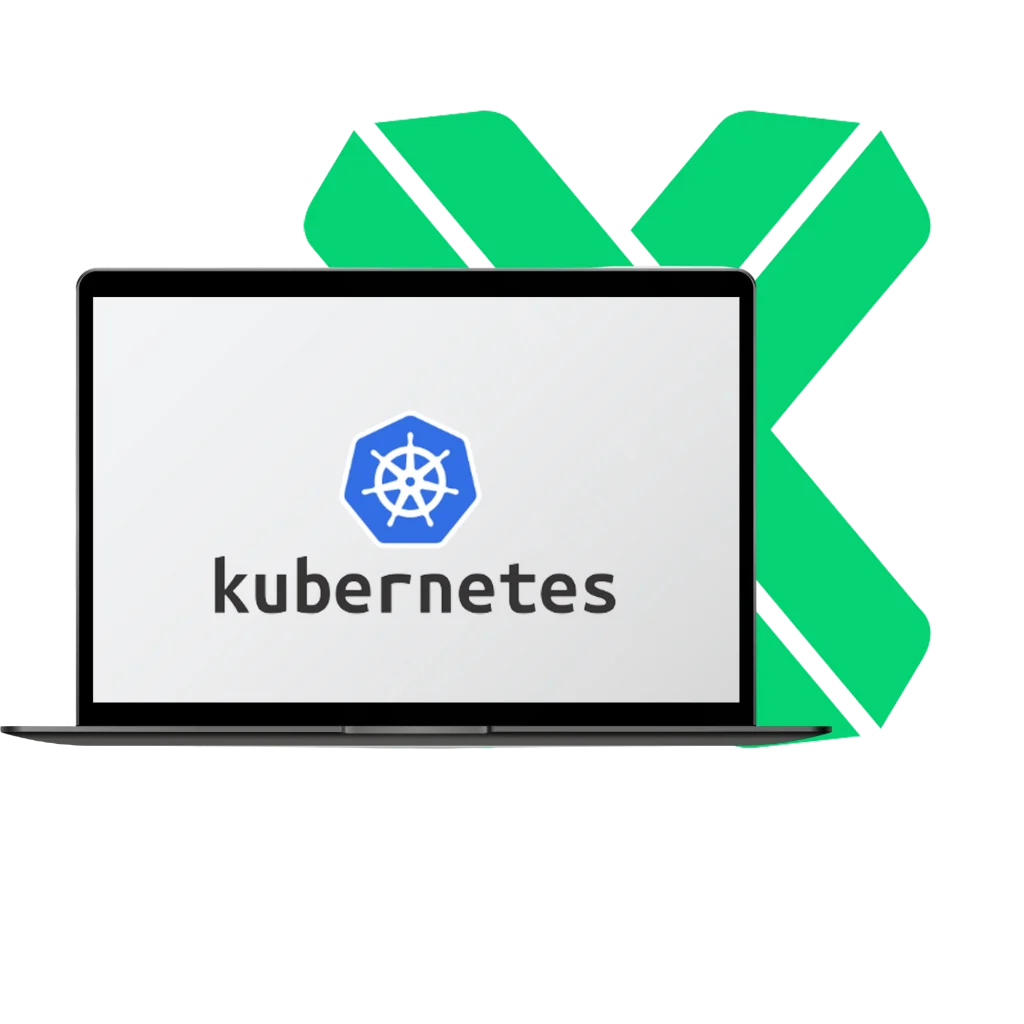KUBERNETES DEVELOPMENT COMPANY
Orchestrate scalable, resilient applications with Kubernetes and nearshore talent.
We quickly assemble skilled teams to design and implement Kubernetes-based solutions that enhance your infrastructure’s reliability, scalability, and efficiency, ensuring seamless operations across diverse environments.

+200 companies rely on
our 1% Top Talent

Kubernetes Development Services We Provide
We offer a comprehensive range of Kubernetes development services, from container orchestration to cloud migration and optimization. Explore our key offerings below:
Kubernetes Cluster Setup and Configuration
We design and set up Kubernetes clusters tailored to your specific needs, ensuring optimal performance and security. Our team configures cluster architecture, networking, storage, and security policies to provide a robust foundation for your containerized applications.
Containerization of Applications
Our experts containerize your existing applications using Docker and Kubernetes, enabling seamless deployment and scalability. We ensure that your applications are optimized for container environments, enhancing portability and consistency across different stages of development and production.
Kubernetes Automation and CI/CD Integration
We integrate Kubernetes with your CI/CD pipelines using tools like Jenkins, GitLab CI, and GitHub Actions. This automation streamlines your development workflows, enabling continuous integration, automated testing, and continuous deployment of your applications.
Microservices Architecture with Kubernetes
We design and implement microservices architectures using Kubernetes, allowing you to build scalable, resilient, and independently deployable services. Kubernetes’ orchestration capabilities ensure efficient communication and resource management across your microservices ecosystem.
Kubernetes Security and Compliance
Our team implements robust security measures within your Kubernetes clusters, including role-based access control (RBAC), network policies, and secrets management. We ensure your infrastructure complies with industry standards and best practices, protecting your applications and data from vulnerabilities.
Kubernetes Monitoring and Logging
We set up comprehensive monitoring and logging solutions for your Kubernetes environments using tools like Prometheus, Grafana, ELK Stack, and Fluentd. These tools provide real-time insights into cluster performance, resource utilization, and application health, enabling proactive issue resolution and optimization.
Kubernetes Migration and Upgrade Services
We assist businesses in migrating existing workloads to Kubernetes or upgrading their Kubernetes clusters to the latest versions. Our migration services ensure minimal downtime and data integrity, while upgrades keep your infrastructure up-to-date with the latest features and security patches.
Kubernetes Maintenance and Optimization
Our ongoing maintenance and optimization services ensure that your Kubernetes clusters remain efficient, secure, and scalable. We handle updates, performance tuning, resource management, and troubleshooting to maintain the smooth operation of your containerized applications.
Why Choose Xpertsoft for Kubernetes Development
Nearshore Expertise
Our developers are primarily based in Portugal, ensuring seamless collaboration with EU-based clients. With real-time communication and bilingual professionals, we offer efficient Kubernetes development and support services tailored to your specific needs.
Broad Technical Expertise
Beyond Kubernetes, our team brings expertise in cloud architectures, DevOps practices, containerization, and microservices. We deliver end-to-end solutions that ensure your Kubernetes implementation is scalable, secure, and optimized for performance across various platforms.
Tailored Kubernetes Solutions
We provide flexible Kubernetes development services that align with your business goals. Whether you need cluster setup, microservices architecture, CI/CD integration, or ongoing maintenance, we tailor our approach to meet your specific requirements and drive your business forward.
The Kubernetes Ecosystem We Used in Previous Work
Containerization and Orchestration Tools
Leverage Kubernetes and its ecosystem to build and manage scalable applications:
- Docker (for containerizing applications)
- Kubernetes (for container orchestration and management)
- Helm (for package management and deploying applications)
- Kubectl (for interacting with Kubernetes clusters)
- Kustomize (for managing Kubernetes configurations)
CI/CD and Automation Tools
Integrate Kubernetes with CI/CD pipelines to automate your workflows:
- Jenkins (for continuous integration and deployment)
- GitLab CI (for integrated CI/CD pipelines)
- GitHub Actions (for automating workflows directly from GitHub)
- Argo CD (for declarative GitOps continuous delivery)
- Terraform (for infrastructure as code and provisioning Kubernetes clusters)
Monitoring and Logging Solutions
Ensure visibility and performance of your Kubernetes environments:
- Prometheus (for monitoring metrics)
- Grafana (for visualizing monitoring data)
- ELK Stack (Elasticsearch, Logstash, Kibana) (for logging and analysis)
- Fluentd (for log collection and processing)
- Jaeger (for distributed tracing and performance monitoring)
Security and Compliance Tools
Maintain security and compliance within your Kubernetes clusters:
- Kubernetes RBAC (for role-based access control)
- Istio (for service mesh and secure communication)
- Vault by HashiCorp (for secrets management)
- OPA (Open Policy Agent) (for policy enforcement)
- Kube-bench (for Kubernetes security benchmarking)
Cloud Platforms and Services
Deploy and manage Kubernetes clusters on various cloud platforms:
- Amazon EKS (for managed Kubernetes on AWS)
- Google Kubernetes Engine (GKE) (for managed Kubernetes on GCP)
- Azure Kubernetes Service (AKS) (for managed Kubernetes on Azure)
- DigitalOcean Kubernetes (for scalable Kubernetes deployments)
- Red Hat OpenShift (for enterprise Kubernetes solutions)
DevOps and Infrastructure Management
Streamline infrastructure management with these tools:
- Ansible (for configuration management and automation)
- Puppet (for infrastructure automation)
- Chef (for infrastructure as code)
- Terraform (for infrastructure provisioning and management)
- SaltStack (for event-driven automation and configuration management)
Development and Deployment Tools
Enhance your Kubernetes workflows with these tools:
- Visual Studio Code (for development and Kubernetes extensions)
- Kubeless (for serverless functions on Kubernetes)
- KEDA (for event-driven scaling in Kubernetes)
- Skaffold (for continuous development on Kubernetes)
- Tilt (for local Kubernetes development)
Key Facts to Know About Kubernetes Development
- Benefits of using Kubernetes
-
1. Automated Container Orchestration
Kubernetes automates the deployment, scaling, and management of containerized applications, reducing manual intervention and operational overhead. This automation ensures that your applications run consistently and reliably across different environments.
2. Scalability and Flexibility
Kubernetes enables horizontal scaling of your applications based on demand, ensuring optimal resource utilization and performance. Its flexible architecture supports microservices, allowing you to scale individual components independently to meet varying workloads.
3. High Availability and Fault Tolerance
Kubernetes ensures high availability by automatically managing the distribution of application instances across nodes. It monitors the health of your applications and replaces failed containers, maintaining system reliability and minimizing downtime.
- Kubernetes is primarily used for
-
Kubernetes development is primarily used for orchestrating and managing containerized applications in various environments, including cloud, on-premises, and hybrid setups. It’s widely adopted for deploying microservices architectures, real-time applications, CI/CD pipelines, and scalable web services that require robust infrastructure management.
- Reasons for Kubernetes's popularity
-
- Open-Source and Community-Driven: Kubernetes is an open-source platform with a vibrant community that continuously contributes to its development, ensuring it stays at the forefront of container orchestration and management technologies.
- Platform Agnostic: Kubernetes works seamlessly across different cloud providers and on-premises environments, providing flexibility in deployment and avoiding vendor lock-in.
- Extensive Ecosystem and Integrations: Kubernetes integrates with a vast array of tools and services, including monitoring, logging, security, and CI/CD tools, enabling comprehensive and efficient infrastructure management.
- Declarative Configuration and Infrastructure as Code: Kubernetes uses declarative configuration files, allowing infrastructure to be version-controlled and managed as code. This approach enhances consistency, reproducibility, and collaboration across development and operations teams.
- Service Mesh Capabilities: With tools like Istio and Linkerd, Kubernetes supports advanced networking features such as traffic management, observability, and security, enhancing the functionality and resilience of your applications.
- Microservices Support: Kubernetes is designed to support microservices architectures, enabling the deployment, scaling, and management of independent services that communicate efficiently within a distributed system.
- Cost Efficiency: Kubernetes optimizes resource utilization by efficiently managing container placement and scaling, reducing infrastructure costs while maintaining high performance and availability.
- Developer Productivity: Kubernetes provides a unified platform for deploying and managing applications, simplifying the development workflow and allowing developers to focus on building features rather than managing infrastructure.
- Useful Links
-
1. Automated Container Orchestration
Kubernetes automates the deployment, scaling, and management of containerized applications, reducing manual intervention and operational overhead. This automation ensures that your applications run consistently and reliably across different environments.
2. Scalability and Flexibility
Kubernetes enables horizontal scaling of your applications based on demand, ensuring optimal resource utilization and performance. Its flexible architecture supports microservices, allowing you to scale individual components independently to meet varying workloads.
3. High Availability and Fault Tolerance
Kubernetes ensures high availability by automatically managing the distribution of application instances across nodes. It monitors the health of your applications and replaces failed containers, maintaining system reliability and minimizing downtime.
Kubernetes development is primarily used for orchestrating and managing containerized applications in various environments, including cloud, on-premises, and hybrid setups. It’s widely adopted for deploying microservices architectures, real-time applications, CI/CD pipelines, and scalable web services that require robust infrastructure management.
- Open-Source and Community-Driven: Kubernetes is an open-source platform with a vibrant community that continuously contributes to its development, ensuring it stays at the forefront of container orchestration and management technologies.
- Platform Agnostic: Kubernetes works seamlessly across different cloud providers and on-premises environments, providing flexibility in deployment and avoiding vendor lock-in.
- Extensive Ecosystem and Integrations: Kubernetes integrates with a vast array of tools and services, including monitoring, logging, security, and CI/CD tools, enabling comprehensive and efficient infrastructure management.
- Declarative Configuration and Infrastructure as Code: Kubernetes uses declarative configuration files, allowing infrastructure to be version-controlled and managed as code. This approach enhances consistency, reproducibility, and collaboration across development and operations teams.
- Service Mesh Capabilities: With tools like Istio and Linkerd, Kubernetes supports advanced networking features such as traffic management, observability, and security, enhancing the functionality and resilience of your applications.
- Microservices Support: Kubernetes is designed to support microservices architectures, enabling the deployment, scaling, and management of independent services that communicate efficiently within a distributed system.
- Cost Efficiency: Kubernetes optimizes resource utilization by efficiently managing container placement and scaling, reducing infrastructure costs while maintaining high performance and availability.
- Developer Productivity: Kubernetes provides a unified platform for deploying and managing applications, simplifying the development workflow and allowing developers to focus on building features rather than managing infrastructure.
Add top 1% devs to
your in-house teams
Tap into the expertise of our top 1% developers. Staff augmentation lets you boost your in-house teams with specialized experts. Expedite timelines without sacrificing output quality.
Here’s how we augment your team

STEP 1
Discovery Call
Share your requirements, budget, and necessary skill sets. We will draft a working timeline and select top developers for your team.
STEP 2
Assembling Your Team
Withindays, we’ll find suitable developers that fit your requirements. We ensure they have the right technical expertise and would be a great cultural fit for your team.
STEP 3
Onboarding and Scaling
After onboarding them, our developers will integrate with your team. Scale your engagement as needed – we’re happy to accommodate your demands.
Get an
entire Team
Looking to bring on more than just a few .NET developers? We’ll assemble a complete crew to support you. Whether it’s full-cycle front and back-end web development, QA, DevOps, UX/UI, or something else. Monitor the team’s performance and manage them as you see fit.
Here’s how you can get a dedicated team

STEP 1
Discovery Call
We’ll learn about your business, organization structure, objectives, budget, timelines, and resource requirements. Then, we can start identifying the ideal talent for you.
STEP 2
Team Assembly and Integration
Once we assemble your dedicated team, we’ll ensure a smooth transition as they integrate with your organization.
STEP 3
Project Kickoff
After onboarding, your team is at your disposal. You’ve now acquired the resources you need without the hassle and high cost that usually comes with recruitment

